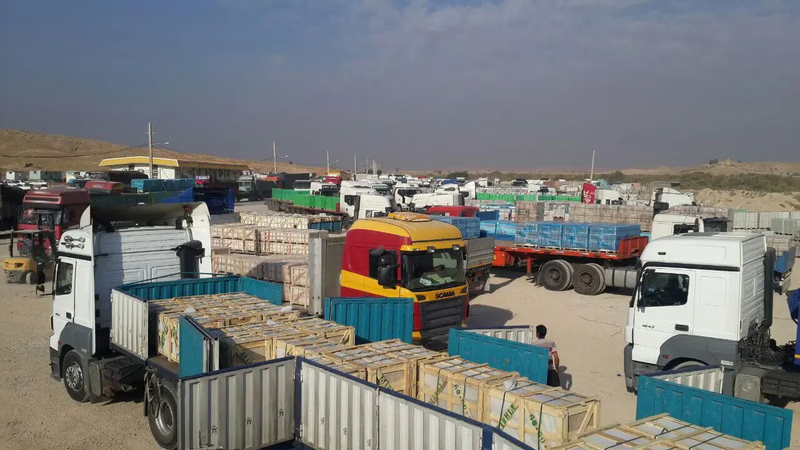
Transporting goods in Iraq: Road networks and logistics solutions.
Road transport is a crucial mode of transportation within Iraq. The country has an extensive road network connecting major cities and towns. Trucks and lorries are commonly used to transport goods across the country. The road transport system includes highways, paved roads, and some unpaved roads. However, the condition of infrastructure and road networks in certain areas of Iraq may vary. Rail transport in Iraq is somewhat limited compared to other modes of transportation. The national railway network connects major cities such as Baghdad, Basra, and Mosul. Rail transport primarily focuses on the movement of passengers rather than freight. However, efforts have been made to improve and expand the rail infrastructure for cargo transport.
Relying on experience and benefiting from the presence of active representatives, some International Transport Group is one of the leading transport companies that has been specialized in transporting goods to Iraq for many years. Among the services of these groups is the transportation of goods, export, and import in Iraq so that the goods are done from the door of the place of loading and export by this company and transported to the destination and finally its import is done and delivered to the owner of the goods.
Today, the most practical method of transportation is loading in the country of origin and sending directly to Iraq by standard trucks, which in addition to customer satisfaction, product security, accelerates the shipping process, and improves loading. Other methods of sending cargo include loading in the country of origin and sending to Iranian border customs terminals. In this method, cargo is loaded from anywhere in Iran and sent to the customs borders of Iran and Iraq, including the Tamerchin border, Somar border, Bashmaq border, Khosravi border, and Mehran border, and from there it is loaded by Iraqi trucks and then moves to the destination.
Iraq is known for its historic rivers, the Tigris and Euphrates, which have played a significant role in transportation throughout history. River transport is still utilized for moving goods within Iraq, particularly in the southern marshlands and along the waterways. Barges and small boats are commonly used for river transport, especially for bulk cargo and agricultural products. Iraq has an extensive network of pipelines, primarily used for transporting oil and gas. These pipelines connect oil fields with storage facilities, refineries, and export terminals. While pipeline transport is specific to the energy sector, it is worth mentioning due to the significant role of oil exports in Iraq's economy.
Cargo to Iraq is transported by sea through the southern ports of the Persian Gulf to the port of Umm al-Qasr or others. Airfreight from any cities and countries such as Iran from Mashhad, Tehran, and Iran's international airports to Najaf, Baghdad, and Basra takes place in the shortest possible time. International Transport Groups provides a variety of transportation, unloading, loading, and clearance services in the country of origin and Iraq and the possibility of transporting cargo to all places, including cargo to Sulaymaniyah, Iraq, cargo attack to Erbil, Iraq, cargo to Basra, Iraq, carries cargo to Samarra, cargo to Baghdad and cargo to Najaf and Karbala. Transportation to Kurdistan also includes Sulaymaniyah, Erbil, Mosul, and Zakho.
This company performs all the necessary steps for transportation from all cities of Iran to all cities of Iraq directly and indirectly with the lowest cost. Our western neighbor suffers from a lack of industrial and service growth due to ongoing sanctions during Saddam's time and two bloody wars with the United States and ISIS. Therefore, exporting to Iraq can be a benefit for Iranian traders. In addition to exporting agricultural and industrial products; the benefits of exporting to Iraq will usually be much more attractive in some new areas, such as health tourism and the provision of technical and engineering services.
Air transport plays a vital role in international trade and shipping to and from Iraq. The country has several international airports, including Baghdad International Airport, Basra International Airport, Erbil International Airport, and Sulaymaniyah International Airport. These airports facilitate the movement of goods by air cargo carriers, allowing for faster and more efficient transportation of high-value or time-sensitive shipments. Although Iraq is an inland country, sea transport is essential for international trade and shipping goods to Iraq. The country has access to the Arabian Gulf through the port city of Umm Qasr. The port of Umm Qasr is the largest seaport in Iraq, handling a significant portion of the country's imports and exports. It serves as a gateway for goods entering or leaving Iraq, with connections to various international ports.
-

Iraq"s trade landscape is shaped by its membership in the WTO and participation in regional agreements like GAFTA. The country maintains strong bilateral trade relations with neighbors such as Iran, Turkey, and Jordan, facilitating the exchange of goods and investment. China stands out as a major trading partner, supplying machinery and consumer goods while being the largest importer of Iraqi oil. India also plays a significant role, providing pharmaceuticals and textiles alongside substantial oil imports. The United States exports machinery and vehicles to Iraq, while South Korea invests in infrastructure projects. Despite extensive trade ties with Iran, data on this relationship is limited due to informal trading practices and sanctions. Iraq"s primary export remains oil, with China and India being key buyers. In 2018, Iraq"s exports were predominantly directed towards China (26.
25%) and India (36. 24%). On the import side, Iraq sources goods from various countries including China (28. 64%) and Turkey (24. 27%). The country also exports agricultural products like dates and grains, alongside chemicals and manufactured goods. Understanding these dynamics is crucial for businesses looking to engage in Iraq"s evolving trade environment.
-
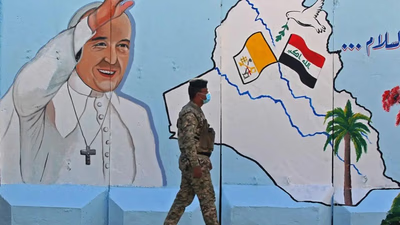
Understanding the export landscape in Iraq requires thorough market research to identify demand, competitors, and trends. Exporters must navigate cultural, economic, and regulatory factors that influence their strategies. Key documentation includes commercial invoices, packing lists, and customs declarations, all of which must comply with Iraqi regulations. The strong trade relationship between Iran and Iraq highlights the potential for profit in this market. Customs procedures vary by product category, necessitating consultation with customs brokers for compliance. Additionally, exporters should be aware of specific product standards and certifications required in Iraq. A reliable logistics provider is essential for smooth transportation and customs clearance. Payment methods such as letters of credit or bank transfers are common, and exploring export financing options can mitigate risks.
Understanding Iraqi cultural norms is crucial for effective communication and relationship-building with local partners. The political structure is complex, with significant power held by provincial councils alongside the central government in Baghdad. The economy is heavily reliant on oil exports, supported by international financial assistance. Staying informed about legal regulations and security conditions is vital for successful operations in Iraq. Establishing local partnerships can enhance market insights and facilitate business connections.
-
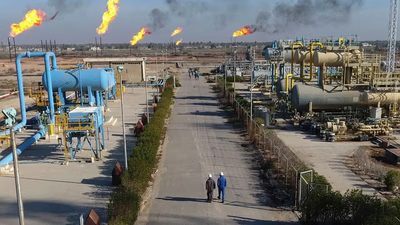
Iraq"s economy is heavily reliant on oil, contributing approximately 95% of its total revenues. Despite being one of the largest oil producers globally, the country faces significant economic challenges due to political instability, corruption, and inadequate infrastructure. The reliance on oil exposes Iraq to global price fluctuations, hindering economic diversification and growth. Efforts to develop sectors like agriculture and tourism have seen limited success, with unemployment rates remaining high, particularly among youth. The government struggles to provide essential services and create jobs, exacerbating social inequalities. International assistance from organizations like the IMF and World Bank aims to address these issues through governance reforms and improved public financial management. However, bureaucratic hurdles and security concerns continue to impede foreign investment in critical sectors such as energy and construction. Iraq"s fiscal situation is strained by its dependence on oil revenues, leading to budget deficits and a high public debt-to-GDP ratio. Reconstruction efforts post-ISIS have been initiated but face challenges that slow progress towards sustainable economic development.
-

Customs clearance in Iraq begins with submitting a customs declaration form via the Automated System for Customs Data (ASYCUDA). Importers must provide detailed information about the goods, including description, quantity, value, and country of origin. Certain items may require import licenses or permits from Iraqi authorities, which must be obtained prior to importation. Essential documents for clearance include a commercial invoice, packing list, bill of lading or airway bill, certificate of origin, and any necessary licenses. Fees associated with customs processing can vary based on the goods" nature and value. Once all duties and fees are settled, goods are released for transport within Iraq. However, navigating customs can be complex due to varying laws across provinces and potential security issues. Exporters must also be aware of cultural contexts and trade regulations that differ between regions.
Documentation requirements may change over time; thus, staying informed is crucial. Consulting local experts or institutions can facilitate smoother transactions but may involve bureaucratic challenges and costs. The customs authorities assess the value of imported goods based on transaction values and applicable tariffs using the Harmonized System (HS) for classification. Inspections by customs may occur to ensure compliance with regulations. "
-

Iraq"s transportation infrastructure is primarily road-based, with trucks being the main mode for goods movement across its extensive network. While rail transport exists, it mainly serves passengers, with limited freight capabilities. International Transport Group specializes in facilitating cargo transport to Iraq, offering services from loading at the origin to delivery at the destination. The most efficient method involves direct loading in the country of origin and shipping via standard trucks. Additionally, goods can be transported through Iranian border customs terminals before entering Iraq. River transport remains relevant, especially for bulk and agricultural products in southern regions. Pipelines are crucial for oil and gas transport, significantly impacting Iraq"s economy. Sea transport through ports like Umm al-Qasr is vital for international trade, while airfreight from various international airports enhances the speed of shipping high-value items. Despite challenges such as sanctions and historical conflicts affecting industrial growth, opportunities exist for Iranian traders in sectors like health tourism and technical services.
-

Iraq"s geography significantly influences its cultural and linguistic diversity. The Tigris and Euphrates rivers provide fertile land, shaping agriculture and settlement patterns. This region, historically a crossroads of civilizations, fosters cultural exchange. Iraq"s population of approximately 40 million speaks Arabic and Kurdish as official languages, with various ethnic groups preserving their unique dialects. The country is rich in history, often referred to as the "cradle of civilization," home to ancient civilizations like the Sumerians and Babylonians. Iraq"s diverse landscapes include lowlands, deserts, and mountainous areas, contributing to its rich cultural heritage. The literacy rate ranges from 60% to 70%, with a significant Muslim population practicing various religious traditions. Iraq"s historical ties with neighboring regions have influenced its culture and trade dynamics.
-
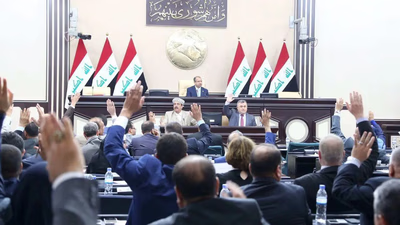
Iraq"s investment laws aim to attract both domestic and foreign investments, fostering economic growth and a conducive business environment. Key legislation includes Investment Law No. 13 of 2006 and its amendments, which offer incentives such as tax exemptions, customs duty waivers on machinery, and land allocation for projects. The laws encourage technology transfer, job creation, and the protection of investor rights while expanding Iraq"s export capabilities. Dispute resolution mechanisms are in place through local courts or international arbitration. Specific sectors like oil and gas have tailored regulations overseen by relevant ministries. Foreign investors benefit from various incentives including insurance provisions, stock exchange participation, long-term land leases, and tax exemptions for up to ten years. The National Investment Commission (NIC) plays a crucial role in promoting investment by providing necessary information and facilitating processes.
However, certain restrictions apply to investments in oil extraction, banking, insurance companies, and land acquisition for non-Iraqis. The Investment Law encompasses diverse sectors such as industry, agriculture, tourism, housing, infrastructure, and services while allowing various investment forms like joint ventures or acquisitions.
-
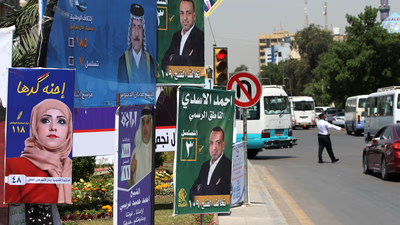
Exporting products to Iraq requires compliance with specific regulations, including labeling in Latin and Arabic. The Iraqi Standardization Institute mandates these labels for goods, particularly from Iran. Failure to meet these requirements can lead to customs rejection, causing significant losses for exporters. Trade routes between Iran and Iraq include both formal and informal customs points, with key locations such as Bashmaq and Parviz Khan Customs facilitating the majority of exports. Understanding the cultural and political landscape is crucial for successful trade, as Iraq"s diverse ethnicities and historical challenges impact business operations. Despite its potential as a lucrative market, exporters must navigate instability and ongoing political issues. The reconstruction efforts in Iraq present opportunities for foreign traders, particularly in sectors like construction and energy, where Turkey has established a strong presence. However, the complex socio-political environment necessitates careful planning and local knowledge to ensure successful market entry. "
-
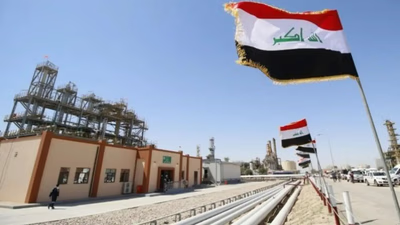
Iraq"s economy is heavily dependent on oil exports, which influences the demand for non-oil goods. Exporters must conduct thorough market research to assess product demand, competition, and potential sales volume in Iraq. Understanding consumer preferences and purchasing power is essential for determining profitability. Compliance with trade regulations, customs duties, and taxes is crucial for successful exporting. Currency exchange rates can affect pricing strategies, so establishing clear payment terms and mitigating risks like delayed payments is important. Political stability and security conditions also impact the business environment in Iraq. Adapting products to local preferences can enhance appeal and profitability. Since 2003, Iraq has been a significant trading partner, with Iran being a major exporter of non-oil goods such as food items, industrial parts, and health services.
For small to medium-sized companies, indirect exporting through intermediaries is often recommended. Competitive pricing based on local market analysis is vital for success in Iraq"s diverse market landscape.









